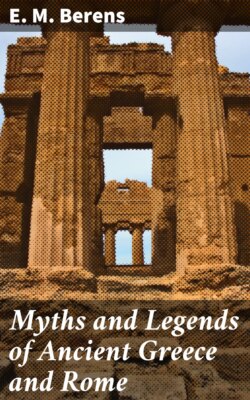Читать книгу Myths and Legends of Ancient Greece and Rome - E. M. Berens - Страница 12
На сайте Литреса книга снята с продажи.
RHEA (Ops).
ОглавлениеTable of Contents
Rhea, the wife of Cronus, and mother of Zeus and the other great gods of Olympus, personified the earth, and was regarded as the Great Mother and unceasing producer of all plant-life. She was also believed to exercise unbounded sway over the animal creation, more especially over the lion, the noble king of beasts. Rhea is generally represented wearing a crown of turrets or towers and seated on a throne, with lions crouching at her feet. She is sometimes depicted sitting in a chariot, drawn by lions.
The principal seat of her worship, which was always of a very riotous character, was at Crete. At her festivals, which took place at night, the wildest music of flutes, cymbals, and drums resounded, whilst joyful shouts and cries, accompanied by dancing and loud stamping of feet, filled the air.
This divinity was introduced into Crete by its first colonists from Phrygia, in Asia Minor, in which country she was worshipped under the name of Cybele. The people of Crete adored her as the Great Mother, more especially in her signification as the sustainer of the vegetable world. Seeing, however, that year by year, as winter appears, all her glory vanishes, her flowers fade, and her trees become leafless, they poetically expressed this process of nature under the figure of a lost love. She was said to have been tenderly attached to a youth of remarkable beauty, named Atys, who, to her grief and indignation, proved faithless to her. He was about to unite himself to a nymph called Sagaris, when, in the midst of the wedding feast, the rage of the incensed goddess suddenly burst forth upon all present. A panic seized the assembled guests, and Atys, becoming afflicted with temporary madness, fled to the mountains and destroyed himself. Cybele, moved with sorrow and regret, instituted a yearly mourning for his loss, when her priests, the Corybantes, with their usual noisy accompaniments, marched into the mountains to seek the lost youth. Having discovered him[6] they gave full vent to their ecstatic delight by indulging in the most violent gesticulations, dancing, shouting, and, at the same time, wounding and gashing themselves in a frightful manner.
OPS.
In Rome the Greek Rhea was identified with Ops, the goddess of plenty, the wife of Saturn, who had a variety of appellations. She was called Magna-Mater, Mater-Deorum, Berecynthia-Idea, and also Dindymene. This latter title she acquired from three high mountains in Phrygia, whence she was brought to Rome as Cybele during the second Punic war, B.C. 205, in obedience to an injunction contained in the Sybilline books. She was represented as a matron crowned with towers, seated in a chariot drawn by lions.
